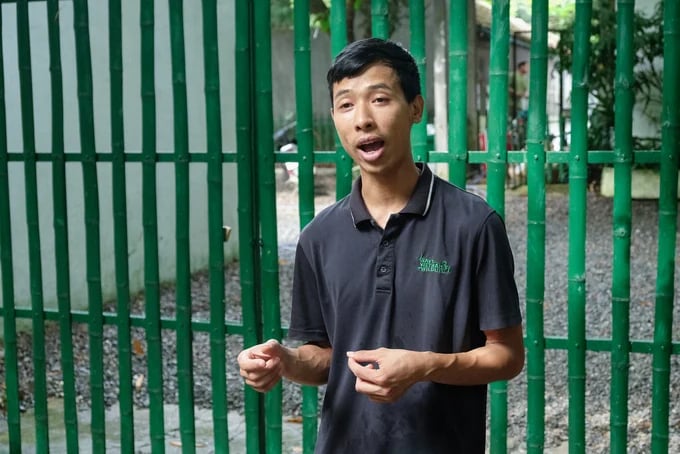May 30, 2025 | 00:40 GMT +7
May 30, 2025 | 00:40 GMT +7
Hotline: 0913.378.918
May 30, 2025 | 00:40 GMT +7
Hotline: 0913.378.918

The preserved specimen of Owston's civet is used as an educational tool and for visitor engagement at Cuc Phuong National Park. Photo: Tung Dinh.
This breeding initiative is part of the Small Carnivore and Pangolin Conservation Program (CPCP). It marks the most significant success to date in breeding and conserving the Owston's civet, offering hope for the eventual restoration of their wild populations.
Owston's civets (scientific name: Chrotogale owstoni) are small carnivorous mammals known for their beauty and ecological importance. However, they are extremely rare in the wild. Classified as Vulnerable by the IUCN Red List of Threatened Species in 2016, they are prioritized for protection and listed in Appendix IB of Decree 84/2021/ND-CP. They have one of the smallest distribution ranges among small carnivores in Asia, found only in Vietnam, Laos, and a very small part of southern China.
Wild populations of Owston's civets are severely declining due to illegal hunting and trade for food and pets. Protecting and recovering the civet population has become a critical priority for biodiversity conservation efforts in Vietnam and globally.
In 2019, SVW, in collaboration with the International Union for Conservation of Nature (IUCN), the Forestry Department, and national and international experts, organized a workshop and proposed Owston's Civet Conservation Strategy 2019-2029. This marked the development of the world's first conservation strategy for this species.
The strategy sets a vision for 2050 and outlines 4 specific goals for the next decade, including the establishment of a healthy and genetically diverse peripheral population, preventing extinction risks, and providing animals meeting the standards for reintroduction into the wild".
To implement these goals, Cuc Phuong National Park, in partnership with SVW, began constructing a 1.3 ha breeding conservation area for Owston's civets in early 2023. The aim is to successfully breed and maintain at least 50 civets to stabilize the population and begin reintroduction efforts.
SVW has invested in building and completing a 350 m fence, 12 animal breeding enclosures, a biosecurity house, and refurbishing a 200 m2 facility for offices, meetings, storage, and food preparation for the animals.
By late 2023, four female and eight male Owston's civets were introduced to the breeding area for pairing, achieving unexpected success with the successful birth of 10 healthy juvenile civets.
Mr. Le Trong Dat, Deputy Director of the Rescue, Conservation, and Development Center (Cuc Phuong National Park), emphasized that successfully breeding 10 juvenile Owston's civets from four pairs demonstrates the effectiveness of dedicating a specific area to the conservation breeding of the species. This success also highlights the experience, knowledge, and professionalism of the team that made this achievement possible.
Regarding the management and care of the civets, Mr Tran Van Truong, the peripheral conservation coordinator at SVW, stated that all civets, including juveniles, are continuously monitored 24 hours a day through a camera system.
"Minimizing human impact on the civets is one of our top priorities. For Owston's civets, if a mother civet detects human interference with her young, she may bite or relocate them. For this reason, human contact with the civets is strictly minimized", Mr Truong emphasized.

Mr Tran Van Truong, the coordinator of peripheral conservation activities at SVW, shared insights into the breeding process of Owston's civets.
"Through this success, we believe we can reintroduce Owston's civets into the wild within the next 3-4 years. To ensure the effectiveness of implementing the 2019-2029 Owston's Civet Conservation Strategy, SVW is actively seeking additional resources and enhancing cooperation with domestic entities such as the Hanoi Wildlife Rescue Center, Saigon Zoo & Botanical Garden, and state agencies to maximize genetic diversity for the captive civet population", said Mr Nguyen Van Thai, Director of SVW.
In addition to restoring Owston's civet population, enhancing measures against illegal trapping incidents is crucial. Owston's civets primarily feed on earthworms, insects, and fallen ripe fruits, making them vulnerable to traps set by hunters.
Many individuals are caught in traps and succumb to forest decay due to irregular trap inspections by hunters. Despite the fact that illegal hunting and trafficking of Owston's civets can lead to criminal prosecution, it is still insufficiently deterrent towards violators. Therefore, stricter sanctions against trapping activities and increased effectiveness in forest protection patrols are necessary.
With these achievements, Cuc Phuong National Park will continue to collaborate with SVW to strive towards the outlined goals of the 2019-2029 Owston's Civet Conservation Strategy aiming to serve as a valuable lesson for conservation breeding and species recovery efforts in Vietnam.
Translated by Hoang Duy

(VAN) Ms. Nguyen Thi Dung, Deputy Director of Ngoc Hoang Cooperative, shared about the journey of bringing dragon fruit to Europe, achieving annual revenues in the billions of VND.

(VAN) Bamboo products from Thang Tho Bamboo Cooperative have reached many countries around the world, while also creating jobs for local workers.

(VAN) The Management Board of Con Dao National Park reported that a green sea turtle, tagged in the Philippines, has traveled thousands of kilometers to lay 84 eggs on Bay Canh Islet.

(VAN) Green technology is paving a new path for sustainable aquaculture in the Mekong Delta in particular and across the country in general, helping reduce emissions and adapt to climate change.

(VAN) On May 27, La French Tech Vietnam (the French startup and innovation community in Vietnam) held the French Tech Summit Vietnam 2025.
/2025/05/27/4731-2-223159_980.jpg)
(VAN) No votive paper, no styrofoam, no plastic bags, no plastic bottles, and no single-use plastic trays are the key rules tourists should keep in mind when visiting Con Dao.

(VAN) In the fight against plastic pollution, Vietnam has been demonstrating a proactive, pioneering, and active role in addressing the greatest environmental challenge today.